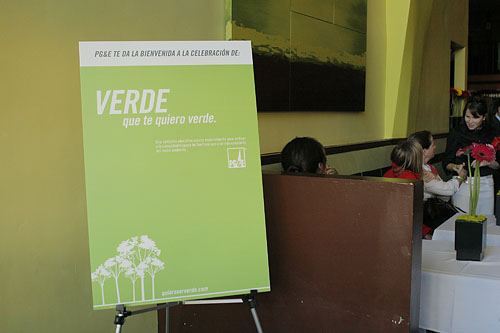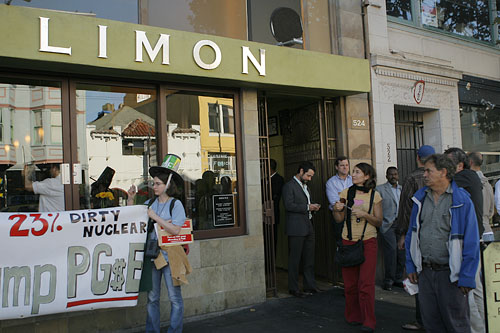Environmental group accuses PG&E
of Greenwashing Latino community

Energy producer PG&E has augmented their 'Let's Green This
City' campaign by targeting San Francisco's Latino community.
An environmental group accuses the company
of 'Greenwashing.'
Photos By John
Han
By John
Han
August 23, 2007
Despite PG&E's widely marketed campaign known as "Let's
Green This City" launched earlier this year, members of a
grassroots environmental group, Green Guerillas Against Greenwash
(GGAG), say the company is "greenwashing" San Francisco.
'Greenwashing' is a term used to describe the actions of a company,
government, or other organization that advertises positive environmental
practices while acting in the opposite way.
PG&E's campaign, as described by the company, is "an
outreach initiative aimed at doing business while maintaining
a healthy, sustainable relationship with our environment."
Members of GGAG, however, point to PG&E's combined energy
production portfolio that includes 65 percent of PG&E's energy
being derived from burning carbon dioxide-producing fossil fuels
and from nuclear power. Only 2 percent of PG&E's energy production
portfolio comes from renewable energy sources, according to the
LetsGreenwashThisCity.org
website.
"PG&E is a nuclear and gas-powered company that has
no intention of moving towards renewable energy policies,"
Aliza Wasserman of GGAG told Fog City outside a Mission District
restaurant where PG&E staged their 'Verde' marketing campaign
targeting the Latino community yesterday.


"The City of San Francisco is considering a really radical
and important policy called Community
Choice Aggregation (CCA) that would break the contract with
PG&E and move to 51 percent renewable energy by 2017,"
Wasserman stated.
"It's a $17 million PR campaign. They're using all this
money to target the Latino community to try to get the message
out that they're environmentally friendly.
"I think they're trying to get community leaders to channel
their attention to Climate Smart," Wasserman projected.
PG&E's Climate Smart program is a carbon-offset program introduced
by the company in June. The voluntary program charges customers
to have their carbon emissions footprint calculated. The revenue
generated from the program is used to pay for clean air programs
such as tree planting initiatives that PG&E says would offset
carbon dioxide-generating emissions.
GGAG, however, is critical of the program saying customers should
not have to pay into a program "so that PG&E can cover
its tracks."
GGAG says the way to reduce carbon dioxide emissions is to increase
clean renewable energy production while reducing dependence on
non-renewable carbon dioxide-producing energy sources.
PG&E environmental communications representative Melissa
Mooney defended the Climate Smart program.
"Those projects are certified by the California Climate
Action Registry," Mooney told Fog City. She said the average
residential customer would pay an additional $5.00 per month on
their bill for Climate Smart.
Mooney estimates as many as two thousand PG&E residential
and commercial customers have signed up for Climate Smart since
the program's launch. There are approximately 15 million customers
in PG&E's total service territory.
"We're expecting the enrollments to increase exponentially,"
Mooney said.
PG&E spokeswoman Darlene Chiu said PG&E has the cleanest
portfolio in the nation and is aggressively pursuing renewable
energy from solar, wind, and hydroelectric sources. According
to Chiu, PG&E derives 13 percent of its energy portfolio from
renewable sources.
"We are doing what we can and looking at every opportunity
to increase our renewable energy portfolio," Chiu told Fog
City. She said PG&E's solar farm is the largest in the country.
PG&E announced in July it would purchase 553 megawatts of
solar power per year from a solar park in the Mohave Desert. The
initiative is expected to bring PG&E's portfolio into compliance
with the State of California's mandate of 20 percent renewable
energy standard by the year 2010.
Wasserman accused PG&E of only striving to meet the bare
minimum requirements noting that PG&E's claimed renewable
energy portfolio is still less than half of what Community Choice
Aggregation legislation is targeting.
Luke
Thomas contributed to this report.
####
|